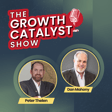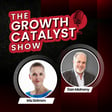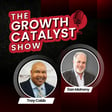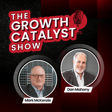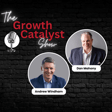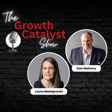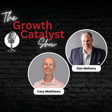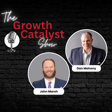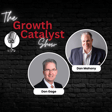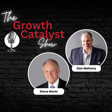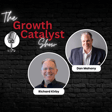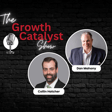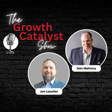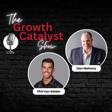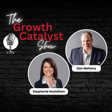Become a Creator today!Start creating today - Share your story with the world!
Start for free
00:00:00
00:00:01

Jonathan Warner: Leveraging Tax Credits for Business Growth
Discover the secrets of maximizing tax savings with Jonathan Warner, Founder of Tax Savings Partners. Join this seasoned expert as he delves into cost segregation and Georgia tax credits to help boost your business's financial health. Gain invaluable insights on leveraging tax advantages for growth in this must-watch episode for ambitious entrepreneurs.
Transcript
Introduction and Personal Growth Mission
00:00:00
Speaker
Welcome to the Growth Catalyst Show where we believe that growth could come in many forms, professional, personal, company, sales, you name it. I'm your host, Dan Mahoney, founder of Transcendent Sales Solutions and a guide to a world of growth possibilities. I've spent my career empowering companies and their people with strategies that accelerate growth.
00:00:18
Speaker
I'm here to bring you stories of these business leaders and their trusted advisors to gain insights into their journeys and learn how they fueled their own growth. Just maybe their journey could become part of your own growth story. Are you ready? Let's grow.
00:00:35
Speaker
Welcome to the next edition of the Growth Catalyst
Guest Introduction and Background
00:00:37
Speaker
Show. I'm your host, Dan Mahoney, and I'm excited to have my next guest here. Today, Jonathan Warner is the president of Tax Savings Partners. He is a 20-year veteran of the Georgia economic development community, having brought tax incentives, organizational development, and leadership consulting to businesses across the state. Jonathan founded the company in 2013 and led the organization through two mergers and explosive growth.
00:01:01
Speaker
through the COVID-19 era. Jonathan, my friend, welcome to the Growth Catalyst Show. Man, this is where all the cool kids are hanging out. I love it. Well, I got you right here, so you' you've you've solidified that, my friend. Thanks.
00:01:17
Speaker
So, well, listen, i'm I'm really excited to talk to you today and and learn about your journey and your growth, your growth story. So, um you I love doing research on the show and getting ready for the show. You are a native of the great state of Florida, correct? Yes, which is getting rained on a lot today.
00:01:36
Speaker
a Yes. We've got, we have a lot of weather coming up at this time of our recording. So, um, so you, I saw that, you know, right out of high school, uh, and I don't know where it was in Florida. Was it central Florida or Tampa Bay area? I grew up. Okay. Tampa Bay. Okay. They're definitely getting hit today. So, um, I saw that you originally got out of college or you went into and you went into aviation technology and then went into the Navy.
Education and Personal Achievements
00:02:04
Speaker
I did. i wanted I wanted to fly airplanes, so I did a two-year degree at St. Petersburg College of Associate in Science and Aviation Technology.
00:02:15
Speaker
and you know all of them my friends and I we all went out to see the movie Top Gun so of course everybody wanted to beat Tom Cruise, right? So um i I had had it with classes and and I was going off to the Navy so I joined the Navy um and didn't become a pilot but I got to work in the aviation community I worked on anti-submarine warfare technology. That was kind of cool. ah If you read any any Tom Clancy's books, that's the kind of stuff that we did. That was fun. And ah the US Navy gave me an amazing gift, compliments of everybody who lives in our wonderful country. is I got about $12,000 to use towards college.
00:03:05
Speaker
So after military service, I attended Embry-Riddle Aeronautical University, ah where I completed a four-year degree in Aeronautical Management. And that's what brought me to Atlanta. So tell me, wendy and first of all, thank you so much for your service. yeah I appreciate it. As a Marine dad, I really appreciate all you've done for our country. ah where where were you Where were some of the places you were stationed, if you can say?
00:03:31
Speaker
ah Sure, um Memphis, Tennessee, Jacksonville, Florida, and then Andros Island, Bahamas. No Pensacola for a Navy guy, really? No Pensacola, no, no. I i went to Pensacola a couple times for a couple of short-term jobs, but that was out of Jacksonville.
00:03:53
Speaker
You know, I noticed something else into your education, which kind of woke me up when I was looking, is you have not only a graduated ah graduate from UGA, go dogs, but you also have some certificate from Georgia Tech.
00:04:08
Speaker
So I've got two certificates from Georgia Tech. I've got the um occupational safety and health ah train and the trainer. So part of what I did with the state of Georgia was consult with companies on their OSHA compliance and I did training. And then I'm also a graduate of the Georgia Tech basic economic development course, which is where I learned all about tax credits and tax incentives for businesses in Georgia.
00:04:35
Speaker
So you, so you went to bolt, so you still, you still, you're still rain red, right? Man, I believe black. I believe red and black. That's, you know, that's, that's what I'm, I'm, I'm proud of. And, uh, you know, it's, it's, it's great to be a Georgia bulldog. I know you're really proud of your family too. Tell me a little bit about your family.
Family and Personal Passions
00:04:56
Speaker
Oh my goodness. Well, my my wife Amy, who is also a Georgia grad, and she did graduate work at Georgia State. She is my partner in life and ah business partner. And I love working with her. And if if we can ever agree on where to set the thermostat, life will be great.
00:05:17
Speaker
So we're we're still trying to figure that out. um Oldest son, Auburn University graduate, electrical engineering. He is now up working in Chattanooga at the Tennessee Valley Authority as an electrical engineer. And ah his younger brother, Charlie, is a senior out of the University of Missouri.
00:05:38
Speaker
and we we just got back from parents weekend so we're we're proud of what he's doing out there. He's going to graduate in business with a concentration in digital marketing and hopefully he will be gainfully employed soon so we can get everybody off the payroll and then we could start you know buying things for us.
00:05:56
Speaker
That's right. Well, you know, one of the things I love about you many things is you are so passionate about things and you're passionate about your work. And one of the things I love about your passion is scuba diving and talk to me a little bit about your scuba diving. I know you're a dive master and you started, I think you, you started a firm dive ventures, uh, recently, uh, a couple of years ago.
00:06:20
Speaker
Dive Ventures is a national chain. Okay. Okay. You didn't know that. Yeah. Yeah. ah So Dive Ventures ah is a company ah owned by ah one of the, ah his name is Dean Hollis and and he's part of the ah in ah public like executives who yeah moved on. And I think he worked for ADM or something and his passion is diving. So he started this company Dive Ventures.
00:06:48
Speaker
and he's buying up all these little shops around the country. They've become the largest retailer in swimming scuba and they bought the shop right down the street from me here in Marietta, Georgia. And during COVID, you know, we were all stuck in the house with nothing to do, right? So I thought, what a great opportunity to become a scuba instructor. So I took the classes and I did the evaluations. And in 2020, I became a a dive professional. And when I'm not ah working here in the company or you know trying to solve problems for my kids, I'm teaching scuba classes at night and on the weekends. And ah it's it jazzes me up. It gets me out, gets me exercise. And I love the community. I love diving. So it was just perfect. And I take it you had a little diving experience for being in the Navy, I'm i'm guessing.
00:07:44
Speaker
No, no, no. ah They didn't teach you how to swim. They didn't teach you how to swim. I did so snorkeling when I was stationed in the Bahamas. That, that was kind of cool. Uh, but, uh, my work in the Navy was on aircraft. So I, I, I spent my time on the flight line.
Business Evolution and Entrepreneurship
00:08:03
Speaker
So let's go to 2013. You started this business called tax savings partners. What was your motivation to start the business?
00:08:11
Speaker
Well, the business has changed a few times. ah ah Started out as Strategic HRD, which stands for Human Resource Development. And that's the concentration ah that I studied at UGA, working on a graduate degree. And ah I did a few projects for companies, mostly in the mostly in the area of organization development and leadership development. And then,
00:08:41
Speaker
I partnered up with a guy that was also in state government. He was in charge of the Georgia retraining tax credit for the whole state. And so I partnered up with him, and then he retired. I bought his part of the business. And so changed the name to Workforce Training Partners, and then just this past year changed the name again to Tax Savings Partners as ah a one-stop shop for Georgia tax credits.
00:09:09
Speaker
and some federal incentives, too. And then we brought on the accounting and bookkeeping. I know I didn't specifically answer your question, but we've ah the business has evolved since 2013. And back when I was with state government,
00:09:25
Speaker
I was the Economic Development Director with Chattahoochee Technical College. And we had some really good training contracts. We were ah ah doing pre-hire training for Lockheed. ah They were ah ah hiring for the F-22 and F-35 project. And this is still ah back in the day when ah we had a presence in Afghanistan and Iraq.
00:09:51
Speaker
And so we were training field IT people before they went overseas. And so we were doing a lot of customized training. And then ah the war drew drew down. So we lost that Army contract. ah The F-22 program was canceled. So we lost that contract. And we had a lot of people working for us. And my job was about to change. ah They were going to move my cheese.
00:10:17
Speaker
So I came home and Amy ah was working as an accountant at AT&T at the time. I come i came home in and said, I got an idea for a business. And so we talked about it and um she said, well, you've you've you've got a couple of years to make it successful or you're going to have to go out and get a real job. And I did not want to get a real job. Don't ever get a real job.
00:10:43
Speaker
Uh, so I had the opportunity to do fun stuff and you know, there've been some ups and some downs, but over the last 10 years, man, I would change very little.
00:10:56
Speaker
As you've grown the business and you've had, like you said, very, uh, several different changes and pivots, it sounds like, and a lot of branding, it sounds like changing your name three times. Tell me some things you've learned along the way is just, it's just being a business owner in general.
Lessons in Business Ownership
00:11:13
Speaker
Yeah. um Well, first thing is learn from people who've made the mistakes before you and listen because ah you know i nobody is born a natural entrepreneur. Some people say, oh, you know you've you've you've got guys like Mark Cuban. name name Name a bunch of other people, right? You know you have to learn from others.
00:11:37
Speaker
And so one of the lessons that i learned was ah what's what's the expression you use your mouth and your ears in proportion so listen to others learn from their successes and their mistakes and then try to emulate what they have done well.
00:11:52
Speaker
and try to avoid the things that have caused others problems. So that's one of the things that I've learned. Have a group of trusted advisors that you can call with questions and be a trusted advisor for other people. And there are folks who have called me and said, hey, I want to start a business. What do I do?
00:12:12
Speaker
And, you know, so I've given others my best advice and I want to see them succeed and grow and do the things that they want to do. So seek advice and be a good ah advisor.
00:12:30
Speaker
That's sage advice. I know there's, there's really no books out there. I mean, there, there's so much stuff out on the internet, but how to start a new business, but you don't know what you don't know, even starting it and incorporating. And yeah, I mean, whether you're running a, an actual business of one or a business of a hundred, you got on a lot of cases, you have to have the same, you need all the same stuff.
00:12:54
Speaker
Absolutely. And you know fine find people that you trust, that you can partner with, and that will you know lead to other successes and allow your business to grow. All right. So I got a question for
Understanding Cost Segregation
00:13:08
Speaker
you. And this part of the this part of our discussion is going to be very educational. It's going to be for me and I'm sure for many others. Tell me what cost segregation and being a cost segregation and tax specialist or tax credit specialist means.
00:13:23
Speaker
Sure. So I want to save business owners actual cash on their state and federal tax obligations. There is a plethora of tax incentives available both in our state and in the country and in in in every state. And so what I try to do is focus on some things that I've learned over the years and things that I do very well.
00:13:52
Speaker
ah So ah to answer your question more specifically, let's talk about the cost segregation piece. So ah businesses that have bought a building are going to buy a building or got to build a building.
00:14:08
Speaker
ah These businesses will, over the life of their building, they will depreciate its value. ah There's what we call real property and personal property. And real personal real property and personal property will depreciate at different rates. ah But to kind of bring it on on home, ah a ah multifamily property will depreciate over a 27 and a half year life.
00:14:36
Speaker
a ah building that is not considered multifamily will depreciate over 39 years. That's what we call the depreciation schedule. So property owners will take a tax benefit say for an office building each and every year for 39 years to get a tax benefit.
00:14:53
Speaker
What the IRS lets business owners do is accelerate that appreciate that depreciation by identifying the different components in the building. For example, electrical systems, plumbing systems, flooring systems, HVAC. All of these components have a different depreciable life. So the IRS says if you can identify what those different components are, you can depreciate those at an accelerated rate, five, seven, or 15 years. And what that does is instead of taking a tax benefit over a long period of time, business owners that own property can shorten the time that they take that tax benefit. What that does is that results in additional tax deductions.
00:15:42
Speaker
And when you have tax deductions, you pay less tax, which means you have more cash flow to be able to pay down debt, reinvest in the business, hire employees, do things that's going to allow you to make more money. So cost segregation at its very simple explanation is accelerated depreciation that results in greater cash flow.
00:16:07
Speaker
So it's not necessarily about the building, per se. It's more like what's inside of it where you can accelerate that depreciation. I mean, you're not going to so accelerate the depreciation on the entire 39 year of ah of a commercial building, but components inside of it basically is where you can start.
00:16:25
Speaker
but's take a moment for a quick word from our sponsor this episode of the growth catalyst show was brought to you by transcendent sales solutions whether your company is facing uncertainty declining sales or resource limitations transcended sales has the solution
00:16:49
Speaker
They take a hands-on, results-oriented approach to solving sales challenges. Visit TranscendenceSales.com to learn more and subscribe to the biweekly Growth Catalyst newsletter for insightful growth strategies. Transcendence Sales Solutions, empowering businesses to reach new heights. And now back to the show. So he here's here's a very simple way to look at it. You've got two types of property. You've got real property. You've got personal property. Consider the real property, stuff that's that's basically stuck to the ground, right? You got your foundation, you got the steel, right? You got the roof. That's what's called real property. You got the personal property. All the stuff inside, inside the walls attached to the ceilings. Those are the components that using an engineering based method, you can evaluate what the five year components are.
00:17:44
Speaker
ah what the 15-year components are and accelerate those components. So that's essentially what a cost segregation project does. And there are a couple of different ways, actually there's more than a couple, but um ah the IRS says it's okay to kind of lump it together but don't get audited because ah what some accountants do that really are not familiar with the process ah is is they will lump everything together, take the deductions, and you hope for the best. What the IRS really likes for companies to do is use an engineering-based method, ah which is ah getting the blueprints, the drawings, a list of everything that's gone into a building, ah and especially if you've built a building, then Architect is going to have that list of stuff that went into the building. And so with that list and then an on-site
00:18:38
Speaker
ah what we call and an on-site survey where we take photographs of all the components, then engineers can go in and identify each component and assign actual values. And that's going to withstand an IRS audit if there ever is one. And that's why the IRS likes the engineering-based method.
00:18:59
Speaker
So, and I, and I, and this is, and you can actually, it sounds like, and from what I've heard you explain it before is you can do this for and plan for it for a new building. I've seen you walk around with your roll of tape, uh, like who carries around like drywall tape with them.
00:19:15
Speaker
Oh my goodness gracious. Oh my, you don't have one in hand Jonathan. All right. All right. It's okay. and no Green zip tape. The only guy I know that walks around with drywall tape that doesn't do drywall. So explain it away.
00:19:33
Speaker
hi I don't do do drywall, but the IRS s ah tells us that, by the way, we we have a letter from the IRS that says this is the only product that allows ah building owners to turn non-load-bearing interior walls from real property into personal property. this is This is the only one. And so what this does is when we're talking about accelerating your depreciation on a property, not only can the walls itself
00:20:14
Speaker
ah be depreciated at an accelerated rate, but everything inside the wall, all the electrical, the plumbing, ah you know who does really well ah using green zip tape, dentist's office, they have lots of plumbing on the inside of the walls and a lot of electrical and all the x-ray stuff.
00:20:34
Speaker
ah All that can be depreciated as five-year property. um and MRI centers, ah they they've got all sorts of weird, wacky technology going on inside the walls. When they use the green zip tape,
00:20:50
Speaker
then they can accelerate the depreciation on everything inside the wall ah to five-year personal property and take a tax benefit. So I don't i don't know much about construction. ah You don't want me doing drywall because, gosh, I would ah probably suck at it if I tried it. But um you want to use this stuff if you're building a building because this results in additional tax savings.
00:21:17
Speaker
Talk a little bit about some of the Georgia tax
Exploring Georgia Tax Credits
00:21:21
Speaker
credits. I know there's retained tax credits, jobs credit, investment credit, because I think a lot of what you talked about now before it was more federal stuff, correct?
00:21:29
Speaker
Right, so when we're talking about cost segregation, we're really talking about tax deductions, meaning that when when we calculate a deduction, we are going to adjust the gross income, and when you adjust that gross income, that means that you pay less tax using more deductions, right?
00:21:51
Speaker
So a tax credit, I like to call this actual cash. This is a, I don't like to use the word discount. it's it's It's a reduction in the amount of tax owed. And so when a governing authority authorizes tax credits, they're trying to incent you to do something. um I remember a few years ago ah when electric cars first came out, Nissan had one, Toyota had one,
00:22:21
Speaker
And there was a federal tax credit, which basically amounted to almost a free car. They were trying to get ah ah individuals to buy these electric cars and get them out on the roads. So that was a a personal tax credit. And so businesses are incentivized ah to do certain things. ah For example, the three tax credits that we Specialized here are the ah Georgia jobs tax credits. And so when companies are increasing the workforce Politicians will say we are creating jobs ah So every state has some sort of a jobs tax credit when you create a certain number of jobs
00:23:02
Speaker
in a certain area of the state, then there will be tax benefits ah that ah can be taken on creating those those jobs. ah The Georgia investment tax credit for companies that are going to invest in their physical facilities or purchase, ah for example, manufacturing equipment, ah then there is a tax credit available ah to ah um do those things.
00:23:30
Speaker
and then the Georgia retraining tax credit, ah which is really where I cut my teeth. That is the incentive for companies to invest in new technology, and then the tax credit is based on the costs that are expended on training employees in that new technology. So that technology ah can can be almost anything that changes in the work environment. So companies that invest in new customized software or SaaS plus platforms
00:24:05
Speaker
on companies that invest in new manufacturing equipment, new tools, other types of technology where companies have to tell their employees, stop what you're doing, learn this new thing, which is different from the old thing, and then you go back to work. That is what makes companies eligible for that tax credit, which is worth up to $1,250 per employee.
00:24:26
Speaker
for tax year. it's It's a very lucrative credit and any company that is ah constantly changing their technologies and trading their employees should be taking this tax credit and not leaving it on the table because companies can spend their money in a more effective way than politicians under the gold dome can do it.
00:24:48
Speaker
never more of a truth statement set on the growth catalyst show. So absolutely. So share, can you share like a success story ah ah of with maybe somebody you work with in the past, you know, just some generalities and what maybe ah some of the work you did for them, how it helped
Client Success Stories
00:25:07
Speaker
them?
00:25:07
Speaker
Oh, sure. i I recently did a job ah for a small business owner. ah This small business owner, he's got one location. And this one location business owner, ah it's it's an auto repair shop. He had ah one ah store that he outgrew. So he had to move all of his equipment and all of his employees to a newer location.
00:25:36
Speaker
Bigger location and I think he's about to outgrow that location ah So what we did for him is first we did because he just bought a building We did a cost set and engineering based cost segregation study. We saved him about 28,000 bucks on his federal tax obligation so he was very happy with that and then we turned around and we did a Georgia retraining tax credit project for him and Save to him another, oh my gosh.
00:26:09
Speaker
Well, $16,000 maybe. So this is real money that he's able to use to pay down his debt and reinvest in his his business. ah we We thought that was a huge success story. um There is an ah a ah rubber manufacturer in North Georgia, a slightly larger international company. ah But they even though they're headquartered outside of the state, they have a presence in in Georgia ah Currently, ah maybe about 80 full-time employees who work there. and Each and every year, as most manufacturers do, they are upgrading their tools, their equipment, they're investing in new technologies to try to make their company better to stay ahead of their competition. and so Each and every year,
00:27:00
Speaker
They are ah realizing tax credits of mid five figures just because they're buying new equipment that they're going to buy anyway. They're training their employees.
00:27:12
Speaker
but they're going to train anyway. And now, because I've been working with with this particular company for almost as long as I've had the business about a little over 10 years, this company gets a tax benefit each and every year that they're reinvesting back into the company. And even though they are a giant global company,
00:27:31
Speaker
That money stays here in Georgia. And I love working with Georgia companies and working with Georgia tax credits because, you know, being from the economic development community, economic development is about the win-win-win. It's a win for the company.
00:27:50
Speaker
It's a win for our state. It's a win for ah the communities where these businesses reside. it's It's about getting us better, maintaining our competitive advantage, not only in the Southeast, ah but all over the country. That's why Georgia is just an amazing place to do business. And it's because we have leadership that has the foresight to have these incentives that reinvest in our businesses and allow us to be better.
00:28:18
Speaker
You not only sound like you know what you're talking about, because I know you do, but you sound like a politician and I would vote for you. so I ain't running for anything, brother. Not on your life, but thank you. All right. so And I know as you continue your growth, and yeah and thanks for the explanation on that, because that that really that really is really good education, understanding what's out there. you know As you continue to grow the next couple of years, I know you and Amy started some to have a new service in the business. Why don't you talk a little bit about that?
New Accounting Service for SMBs
00:28:48
Speaker
We do. you know um ah Amy, who is ah our vice president of accounting and bookkeeping, and I think she thinks she's also the vice president of the thermostat, we're still working on that. um She's had ah ah just an amazing career um in the accounting world at AT and&T.
00:29:10
Speaker
And she's had some recent experience ah doing accounting and bookkeeping for small businesses with another firm ah after her retirement from AT and&T. And I am just so excited to have her join tax savings partners to ah provide leadership in our ah accounting and and bookkeeping service. And so what we're looking to do is serve small to medium sized companies, 250K up to 10 million in revenue.
00:29:39
Speaker
and give them the the not only the advice but also the services that will allow them to be able to focus more on their business. ah There are a lot of small business owners. I had a conversation with a dentist this morning and this dentist ah he's He's tired of doing his books. He had another service that wasn't really doing specifically what he wanted. And so he thinks that by outsourcing this function ah to a firm like ours, he's going to be able to focus more on dentistry. And his staff is going to be able to focus more on serving their customers. And so that's what we want to do is clean up the books.
00:30:22
Speaker
ah make sure that everything is ready so when his CPA says it's time to do tax planning or it's time to file your taxes everything is in a neat package it's done correctly and it's ready to go. That's awesome because I could tell you a small business owner myself at service is needed because you get yourself into QuickBooks and you think you know what you're doing until you do your first couple tax returns and you realize your CPA tells you you don't know what you're doing. Exactly. and so what you know where We are very fortunate that we have CPAs that are not afraid to pick up the phone and say, Jonathan and Amy, we've got a client and their books are a mess. We're not going to do it because that's either not what we do or the business is so small, you know we're going to have to charge them X hundreds of dollars per hour to do this work.
00:31:17
Speaker
if you can take this client on, fix them, and then send us the file through QuickBooks, that that's a big win. So talk about a three-way win. yeah We're happy to have the business. it's It's a win for us. But most importantly, it's a win for the CPA firm because they have a trusted um ah service that can do this work that they need done and boy is it a huge win for the small business owner who really needs their books done ah correctly and they need to have a partner that's going to work ah not in lieu of but in partnership with their CPA and so that's something that we feel very strongly about is you know our business is tax savings partners. We want to partner ah with our our financial advisor partners, with our M and&A partners, with our CPA partners to work together ultimately to make sure the client gets exactly what they need, when they need it, and in the way ah that they want it done.
00:32:22
Speaker
Jonathan, I love your story. I love your passion and I love your vision. And I really appreciate you taking some time on the Growth Catalyst show today. Last question.
Conclusion and Contact Information
00:32:33
Speaker
If someone's interested in learning more about tax saving partners and saving some more money or learning how they can help or get some help with their fixing their books, what's the best way to get ahold of you guys?
00:32:44
Speaker
taxsavingspartners dot.com. Check out our website. um There's a button that you can press to schedule a meeting with me. Everybody's doing that, so I want to be one one of the cool kids. Press the button, and you can choose a 15, a 30, or a 45-minute meeting. There's also a place on our website where you can enter in some additional information that gives us a little more to work on, and that will let us know, do you want to have a conversation with Jonathan?
00:33:13
Speaker
Do you want to have a conversation with me will answer all your questions and anything that we can do we want to be able to serve and sometimes. Sometimes we're not the right solution and i've got a network of people and amazing network of people that i can call upon to get things done for our clients if we can do it.
00:33:33
Speaker
if If our clients need accounting and bookkeeping, you know, ah over $10 million, dollars then we're going to refer that out to somebody who can handle a larger company. We just want to make sure folks get what they need
00:33:59
Speaker
Thanks for having me, appreciate about it buddy.

